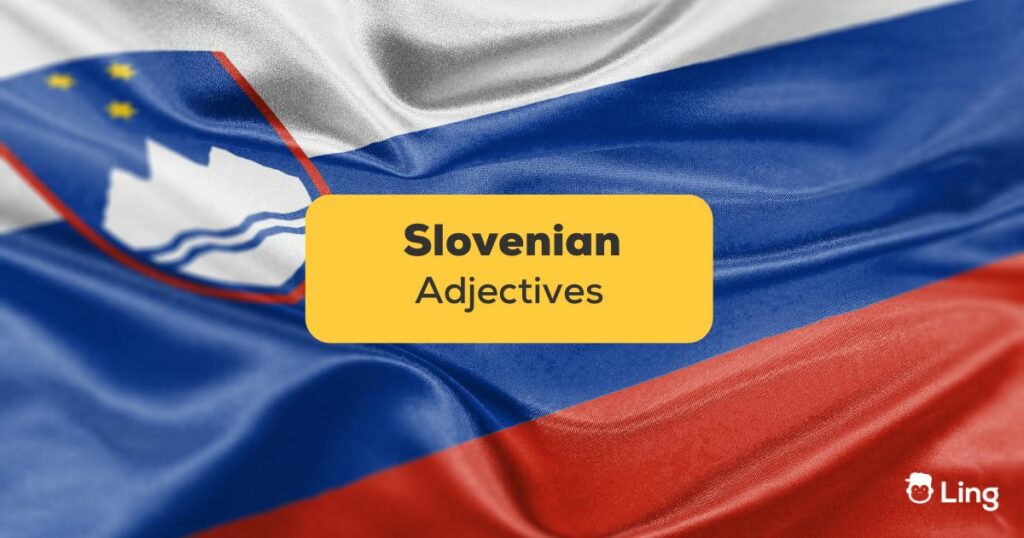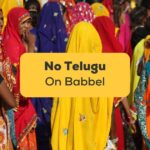Life without adjectives would be very boring. Imagine not being able to express our feelings and describe the things we’re talking about. They help us express our thoughts, feelings, and observations in a much more interesting and detailed way. Just think about it—without them, we wouldn’t be able to describe the beautiful sunset or the cozy blanket!
In this article, we’ll talk about Slovenian adjectives while also making sure you develop a strong foundation when learning Slovenian grammar. Curious? Let’s begin!
Slovenian Language And Adjectives
In Slovenian, adjectives, or pridevnik, play a crucial role in communication. They help us describe the characteristics, qualities, and attributes of nouns, making our language more precise and expressive. They also come in various types, and each type follows its own set of rules depending on the gender, number, and case of the noun they’re describing.
For example, let’s take the adjective lep (beautiful). If you’re describing a masculine noun in the nominative case, you’ll use lep. But if you’re talking about a feminine noun, it becomes lepa. And if it’s a plural noun, you’ll say lepi for masculine and lepe for feminine.
Ready to learn more? Keep reading below!
Rules Of Slovenian Adjectives
Slovenian adjectives change their endings based on three things: case, gender, and number. It might sound complex, but it’s really just a matter of paying attention to the noun they’re modifying. The case is all about the role the noun plays in a sentence – is it a subject, an object, or something else? – Gender refers to whether the noun is masculine, feminine, or neuter. And number, well, that’s pretty straightforward – is the noun singular or plural?
When you put these three factors together, you get different patterns of adjective endings. It’s like a mix-and-match game! Once you start recognizing these patterns, you’ll be able to use adjectives correctly in no time.
Gender
The Slovenian language has three genders. Adjectives can be feminine, masculine, or neuter and change form based on the gender of the noun they describe.
Let’s examine this more closely:
Feminine Nouns
To form adjectives, make sure to use the appropriate ending – with feminine adjectives, the ending -a is added. For example:
- Masculine Singular: lep (beautiful)
- Feminine Singular: lepa hiša (beautiful house)
Masculine Nouns
Adjectives in their basic form usually end with a consonant and are considered masculine. When describing them, no additional endings are added to the base form. For example:
- Masculine Singular: lep (beautiful)
- Masculine Singular: lep avto (beautiful car)
Neuter Nouns
Adjectives take the neuter form by adding -o to the masculine singular base form when describing neuter nouns. For example:
- Masculine Singular: lep (beautiful)
- Neuter Singular: lepo mesto (beautiful city)
Number
Slovenian can be a bit tricky sometimes, as adjectives can have singular, plural, and dual forms! Not many other languages have this distinction. All the forms also have genders. Plural and dual endings of the adjectives in nominative are usually the same as the noun endings.
| Singular nouns | Dual nouns | Plural nouns | |
| Masculine | star moški (old man) | stara moška (two old men) | stari moški (old men) |
| Feminine | visoka stavba (tall building) | visoki stavbi (two tall buildings) | visoke stavbe (tall buildings) |
| Neuter | zeleno drevo (green tree) | zeleni drevesi (two green trees) | zelena drevesa (green trees) |
Case
There are six cases in Slovenian. The good news is that the noun ending and the adjective ending for feminine and neuter usually match! There are exceptions, of course, that need to be learned by heart. Here are some examples:
| Masculine | Feminine | Neuter | |
| Nominative case | dolgi korak (long step) | modra hiša (blue house) | odprto okno (open window) |
| Genitive case | dolgega koraka | modre hiše | odprtega okna |
| Dative case | dolgemu koraku | modri hiši | odprtemu oknu |
| Accusative case | dolgi korak | modro hišo | odprto okno |
| Locative case | dolgem koraku | modri hiši | odprtem oknu |
| Instrumental case | dolgim korakom | modro hišo | odprtim oknom |
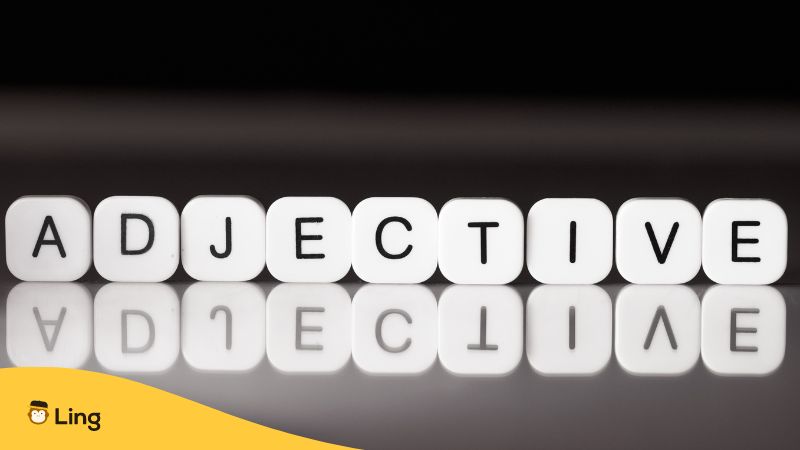
Possessive Adjectives
A possessive adjective is called svojilni pridevnik. It comes from personal pronouns with added suffixes. It, too, varies based on gender, case, and number.
| English | Slovenian | Masculine Possessive Adjective | Feminine Possessive Adjective | Neuter Possessive Adjective |
| I | jaz | moj | moja | moje |
| you | ti | tvoj | tvoja | tvoje |
| he | on | njegov | njegova | njegovo |
| she | ona | njen | njena | njeno |
| it | ono | njegov | njegova | njegovo |
| we | mi | naš | naša | naše |
| you | vi | vaš | vaša | vaše |
| they | oni | njihov | njihova | njihovo |
Comparative And Superlative Forms
Slovenian adjectives have three different levels when it comes to their intensity – the positive (osnovnik), comparative (primernik), and superlative (presežnik). The positive form is just the adjective itself. We usually use the comparative form to compare two things or people. The superlative form is the form with the highest intensity.
Here’s a simple example of the three levels:
- Mlad (young) – mlajši (younger) – najmlajši (the youngest).
- Hiter (fast) – hitrejši (faster) – najhitrejši (the fastest).
But just to make things more interesting, some exceptions make comparative and superlative forms have different endings. This makes them irregular.
- Težek (heavy) – težji (more heavy) – najtežji (the heaviest)
Some comparative and superlative forms, such as colors and conditions, need the words bolj (more) or manj (less) to describe them:
- Mrzel (cold) – bolj mrzel (colder) – najbolj mrzel (the coldest)
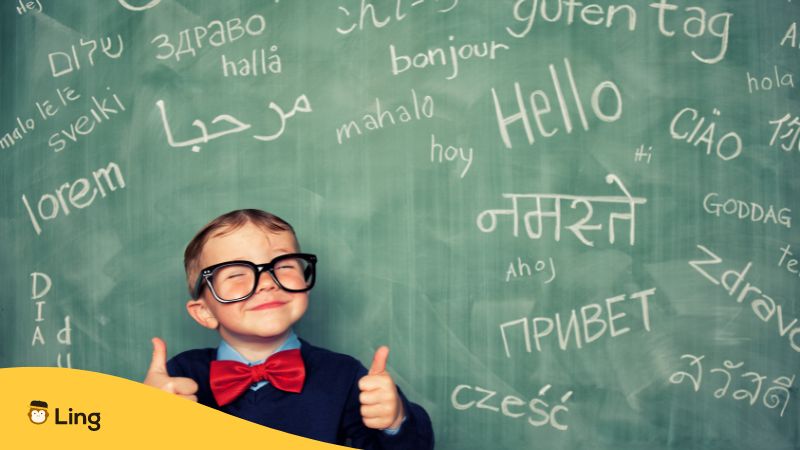
Most Common Adjectives In Slovenian
Now that you’ve mastered all the rules of grammar, here’s a list of the most commonly used Slovenian adjectives (in their masculine form) that will help you speak like a pro in no time!
| English | Slovenian |
|---|---|
| big | velik |
| small | majhen |
| beautiful | lep |
| ugly | grd |
| good | dober |
| bad | slab |
| happy | srečen |
| sad | žalosten |
| smart | pameten |
| dumb | neumen |
| light | lahek |
| heavy | težak |
| warm | topel |
| cold | hladen |
| dry | suh |
| wet | moker |
| clean | čist |
| dirty | umazan |
| soft | mehak |
| hard | trd |
| fast | hiter |
| slow | počasen |
| cheerful | vesel |
| angry | jezen |
| tired | utrujen |
| awake | buden |
| quiet | tih |
| loud | glasen |
| full | poln |
| empty | prazen |
| tall | visok |
| short | nizek |
| wide | širok |
| narrow | ozek |
| long | dolg |
| short (length) | kratek |
| thick | debel |
| thin | tanek |
| bright | svetel |
| dark | temen |
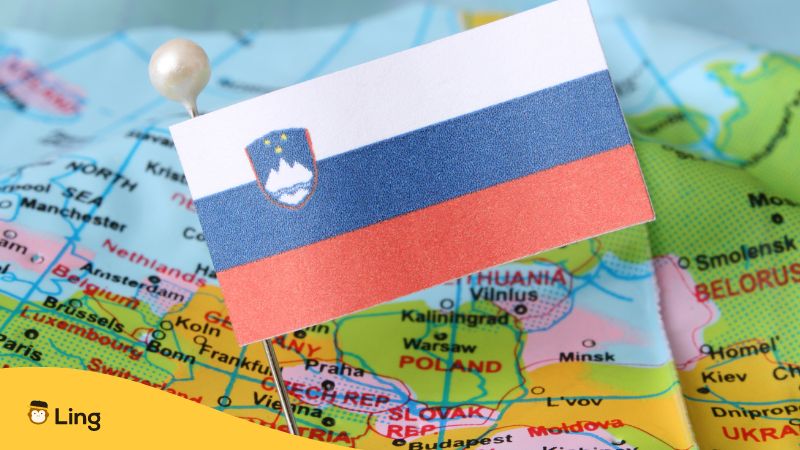
Learn Slovenian With Ling
If you’re planning your next adventure to Lake Bled or the Postojna Cave, you are now equipped to express their beauty and charm! If you’ve made it this far, I’m sure you’re pretty good at speaking Slovenian already. But why not try to be even better?
With Ling, you can do daily lessons on the go. Just jump on the App Store or Google Play Store and download it today to start a fun-filled language-learning adventure! And if you want to learn about other language rules, such as Slovenian prepositions, we’ve got you covered as well!
